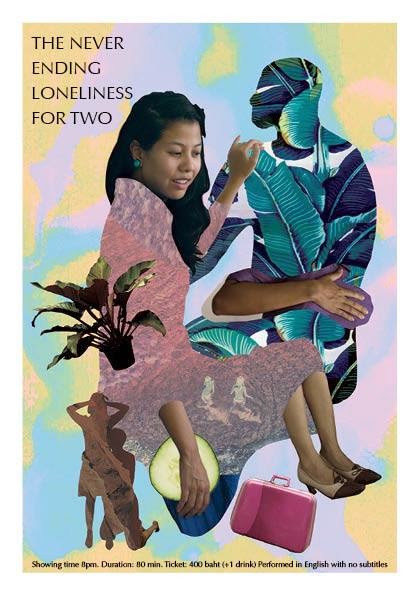The
Never Ending Loneliness for Two directed by Egle Simkeviciute Kulvelis
The Hop,
Silom Bangkok. 21st June 2014
Lithuanian
writer Sigitas Parulskis’s The Never Ending Loneliness for two was shown last weekend at The Hop, an
interesting venue that usually functions as a dance studio on Silom Road,
Bangkok - a city with pockets of vice, seedy streets, and upmarket massage joints.
Where foreign men brand themselves heroes while saving burned souls, patching up torn-up
dreams, trampled hopes. Where high society Thai love affairs flourish, precious
daughters in sharp office suits and iPhones crushing candy or chasing cookies
on the Mass Transit systems while messaging loved ones online. A city where
promiscuity is considered normal and even encouraged with a few minor wives and
major heartbreak along the way. Love is a strange concept in Bangkok, yet
desire, greed, and gratification hangs above every street like the tangled
electrical wiring betwixt concrete posts. Hedonism leaps from one room to the other like cats springing from
building to building landing on perilous balconies, nine lives intact, terminal dermatitis
and tangled, knotted tails. A city more befitting for the darkly disturbing Never
Ending Loneliness for Two there may not be.
Five
different couples each have their own scene, yet one may feel, owing to the
chemistry between the two actors (Pattarasuda Anuman Rajadhon and James Laver)
we are watching the same couple experiencing poignant stages of their
relationship, and perhaps we are. What we percive may be more powerful than what is intended. Prize-winning Lithuanian poet, essayist and
playwright Sigitas Parulskis has created a piece of literature dealing with
universal issues; romance, sex, death of romance, violence, threat of violence
and ultimately death. Kulvelis manages to shine a light on the darkness of it
all with the help of a strong cast and interesting venue, the stage backed by a
huge mirror, and spiral staircase leading perhaps to despair...
We
begin with a rekindled love affair of two former school children which
transfigures into a simple tryst between a client and a prostitute in a hotel room. Hmmm. Sense
that moment when one lies to oneself and to the other with the impossible hope that
they we are entering somebody else, a ghost, a memory, an ideal, equal. Rajadhon
performs her role with enormous energy and emotional range, Laver responds with
equal verve and strength. The technique here and throughout the production is the
use of both inner dialogue and direct exchanges between the couple(s). This is
perhaps a difficult technique to perform well and at times effective, at others distracting.
The play runs at warp speed, the audience have little time to reflect on the effectiveness of narrative structure. It is the words and the delivery that count.
A
couple meet on a train and following the exchange of a few words the inner dialogue
is narrated by the pair. While attracted to one another they both realize that
the shyness that attracts them to each other is the very obstacle that will
keep them apart.
The
first flash of potential violence evolves as our next couple tussle with a prop
that may or may not be a gun, and they escape unscathed apart from the physical
and verbal bruises.
“Nobody
would give a gun to a nut like you.” – She
tells him.
A wife
and husband have reached the point where each one knows what the other is
thinking. The joy and familiarity of despair is all that keeps them together,
trapped by what was once desirable now a cruel glue binding them to eternal indifference. There appears to be only one means of escape ..
“I
asked her although I know the answer, communication becomes impossible, all the
answers have been learned by now, and questions – questions are meant for
oneself so as to push the answers further away.”
And...
And...
“A
knife-edge is the straightest and surest way to intimacy,”
A fine
line and one of many in this well-written, at times perhaps, over-written
treatment. The language is thoughtful, careful, and rich. We discover the killing of his wife was but a wishful dream.
The final scene. Tombstone
Mirrors. Set in a cemetery where a man meets his first love, a woman married to
another man:
“You
wanted to be like the dead, especially dead for me, and I, had already been a
ghost for a quite a while by then, hearing nothing, saying nothing, a shade
wandering in the graveyard.”
This
strongest scene extends the ambiguous themes explored throughout this dark
literary stage production. We are left to wonder if the two characters have finally left
the earth to reunite in heaven? Were all the couples connected in some
unearthly way? The same couple?
The audience likes to participate with a novel, a film or a play. One way the writer and director can do this is to leave us asking questions.
The audience likes to participate with a novel, a film or a play. One way the writer and director can do this is to leave us asking questions.
One answer to these questions is that we are just like the Bangkok cat jumping from balcony to
balcony and glimpsing through grime-stained windows and quietly watching the bizarre human relationships that percolate within the private
loneliness couples compulsively cultivate around the world. Every minute. Each day.
The
Never Ending Loneliness for Two
continues this weekend at Toot Yung Art Center, Bangkok. For more information and tickets visit
their facebook page HERE



No comments:
Post a Comment